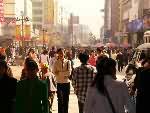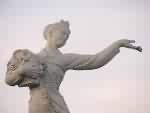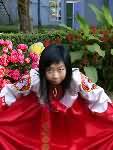- Getting around Lijiang. Dont stay in the Old Towns more than 2 days, there is nothing to do. KRISS Oct 9, 2013 05:46
- 2013 Beijing Temple Fair BENNYLAU Feb 26, 2013 03:29
- Malaysian traveling from KUL - LAX vis Shanghai PVG ZATI_DY Jan 3, 2013 20:15
Putting on the Hanbok - Yanji City
- Views: 8192
- |Vote: 3 0
- |Add to Favorites
- |Recommend to Friends
Jilin's Remote Boomtown
Part of what makes China colourful and a fascinating country to be in is its ethnic diversity. There are 56 officially recognised ethnic minority groups living within China's borders, most of which preserve at least some of their distinctive cultural traditions as well as developing their society and moving ahead with a rapidly changing China. Some of these ethnicities are found only in China; others are the descendants of immigrants come to make new lives in China many years ago: the Muslim peoples of the Northwest; the Mogolian and Russian minorities in the North, and in China's far Northeast, the Korean people of Yanbian.
Whilst many of China's ethnic minorities have, over the years, become more and more integrated with the majority race - the Chinese Han people – others have flourished more or less independently. In Yanbian is to be found a people who perhaps more than any other of China's ethnic minorities have formed a secluded and prosperous society that embraces both their own and mainstream Chinese culture, and has developed a certain autonomy that distinguishes itself from the rest of the country.
Nowhere in Yanbian is this more apparent than in the region's prefectural capital, Yanji. A small city by Chinese standards, Yanji has a population of only 350,000 people – but at least 60% of those are ethnic Korean (Chaoxianzu), and so the Korean people enjoy a majority presence in a region that, owing to its distance from everywhere else in the country, is seldom visited by tourists and other regular travellers. The Koreans have the upper hand economically as well – major businesses and investments are ethnic Korean concerns, and Korean signs generally take precedence over Chinese – one of the only places in China where this happens. Even the central city's KFC uses Korean Hangeul characters in its shop-front signage, with the franchise's Chinese name listed beneath, almost as an afterthought. A bright and bustling town of apparent wealth, Yanji is known within China as 'Little Seoul' – a city that has followed the model of Korean entrepreneurship that brought South Korea's capital from one of the poorest cities in North-eastern Asia to become a world-class metropolis within a few decades.
It's Yanji's relationship with Seoul that has really secured its economic prosperity. After China normalised diplomatic relations with South Korea in 1992, South Korean money began to flow freely into the region as investors from Seoul began eager investments in a city that not only possessed Chinese trade advantages, but also spoke and conducted business in their own language. Young ethnically Korean people in Yanji too began to demand Korean products as they became increasingly exposed to a powerful and forward-moving society with which they shared deep cultural ties. As the purchasing power of the people of Yanji improved, so did South Korean products find a fresh, new market – meaning that in this otherwise remote, insignificant border town of Jilin, highly fashionable goods available nowhere else in the country began to surface. Now, Yanji is perhaps one of the most developed cities in the entire province, if not the whole of Dongbei, rivalling Changchun and Jilin City as the most infrastructurally advanced centre of the region.
Yanji also enjoys a lucrative export market to Korea – labourers enthusiastically take on projects in South Korea to bring home foreign money, and Chinese goods also find strong export potential via Yanji's ties with South Korea. Ironically, perhaps, trade with North Korea is far less satisfying, despite the fact that the vast majority of ethnically Korean Chinese in Yanji originate from Korea's Northern provinces – a consequence of the rather less healthy economy of their immediate Korean neighbours. North Koreans do operate a few hotels here and there throughout the city, but it is indisputably South Korea that is the star in the locals' eyes.
Living Korean Style
In Autumn, the Yanbian countryside is a cascade of rich earthen colours; acres of forest shimmer in dances of gold, ruby and emerald leaf. Yanji is a kind of Shangri-la of the woodlands; lost in the realm of the forest, Yanji is a rich and clean paradise far away from the industrial landscape of elsewhere in Dongbei. Coming out of the Yanji railway into the bright activity of the station yard, my travelling companions and I felt as if we had travelled so far into the Chinese countryside that we had been delivered into a new land.
The evident Korean presence only added to the sensation of being in a different country altogether. All around, big signs in Korean writing and decorated with portrayals of young Korean beauties in traditional hanbok dresses welcomed visitors to Yanbian with promises of distinctive regional cuisine, specialised shopping locales, and that most popular luxury of the Asian business set: spas and massage.
We were at the final destination of our holiday exploring the Korean culture of the Chinese North-east, and so wanted our last night in Yanbian to be in authentic Korean style. An earnest taxi driver advised us to stay in the Wan Guo (Ten-thousand Nations) hotel on Tuanji Lu – a middle-price hotel that generally caters for international guests from Korea, and is decorated in classic Korean fashion. We took his advice, and were most satisfied that we did. Wan Guo, very close to Yanji's star building, the Guo Mao International Trade Centre, offered us a very comfortable Korean-style room for four people for just 140 yuan, a price that came with complimentary breakfast and free access to the hotel's spa and sauna.
Never having stayed in Korean accommodation before, we were surprised to find that the room was almost entirely empty when we arrived. The most obvious and alarming absence was that the room had no beds. We were respectfully informed that Koreans traditionally do not sleep on beds, but on thick duvet mattresses that are unrolled onto the floor in the evenings. In addition, the entire floor is heated – traditionally, this is done by sub-floorboard furnace pipes, but in these times is done by electric power. The room featured sliding paper doors not unlike those found in Japan, and a separate bathroom privately installed away from the sleeping area.
Korean Pleasures
We had the rest of the day to inspect the city. Yanji is primarily a business town, and hasn't had much call for tourist development, except in that it is close enough to Changbaishan to claim it as a local attraction, much like all other major cities in Yanbian. The city itself is clean and energetic, and the familiar streetside entrepreneurship of all Chinese cities, wares laid over blankets on the pavement, carts of fruit and nuts and countrysiders wearing heavy olive-green jackets calling at passers-by, were welcoming additions to the otherwise highly-developed street face, like decorations on a Christmas tree. We didn't see any temples on the map, but from a bridge over the Yan River in the North of the city we saw a great Christian cathedral, on the top of which was the same kind of large, red neon cross that can be seen all over Seoul. Traditional Korean religion closely resembles Christianity, and so Koreans were far more greatly influenced by early Christian missionaries than any other Asian peoples, and Christianity is as popular in Yanji as it is in Korea itself.
Not far away from the church is Yanji Park, also called the People's Park. It is the primary relaxation area in the whole city, and also contains a small zoo, complete with bears, tigers, all kinds of monkeys and a mysterious creature called the 'Beautiful Woman Snake' – the enclosure illustrated with a picture of a long snake with a woman's head. The snake costs 10 yuan to see, and we were not curious enough to be scammed on this particular occasion. Throughout the park, photographic stalls offer visitors the chance to be photographed in traditional Korean clothing; billowing hanboks and loose, baggy white trousers with small, tight waistcoats. If you're in the park at the right time of day, you'll see genuine Chaoxianzu people performing the highly animated dances and songs that the region is famous for within China.
My niece is half Korean, and I had intended to pick up some Korean baby clothing for her whilst visiting Yanji. Imported Korean clothing (Hanfu) is sold at specialist stores all over the main business area, but the best place to shop for something original is in the great clothing malls off the pedestrian street on Jiefang Lu. Locally made Korean wear, as well as clothing of all other varieties, is available here at very affordable prices. I found a delightful yellow and pink hanbok that my niece will look adorable in for just 60 yuan – imported Korean babywear costs over a thousand.
Local midrange restaurants serve fantastic authentic Chaoxianzu food. A speciality is large, black potato dumplings – resembling regular Chinese jiaozi, the dumplings are stuffed with spicy mashed potato in a thick, gelatinous dumpling dough. They are best eaten hot, and dipped in salty chilli oil. Otherwise, kimchee and mixed rice and all other typical Korean delicacies are abundant in Yanji – and it goes without saying that the real thing is always better than the imitation Korean food sold elsewhere in China.
My only disappointment in Yanji was the fabled spa baths. Lao Hei and I decided to relax in a spa in the evening, and took the elevator down to the baths level with high expectations. Passing through the foyer, a naked man in the locker room greeted us and asked us to remove all of our clothing. Reluctantly, we did so and then waddled in the nude through to the spa. The main area was a warm swimming pool, the only difference from the kind of swimming pools we were used to being that all the swimmers were naked. Middle-aged businessmen from Seoul stood under bare faucets soaping themselves in the lukewarm spray. We rather modestly wrapped towels around ourselves, and took to the small steam sauna at the side, only to emerge five uncomfortable minutes later stinking of sweat and eucalyptus. A few other men were receiving oily massages -from other naked men. The place just wasn't our scene, and we escaped back to our hotel room, ashamed of being shy Westerners.
I have it on good information that the women's spa is far more interesting.






 Copyright © 1998-2025 All rights reserved.
Copyright © 1998-2025 All rights reserved.